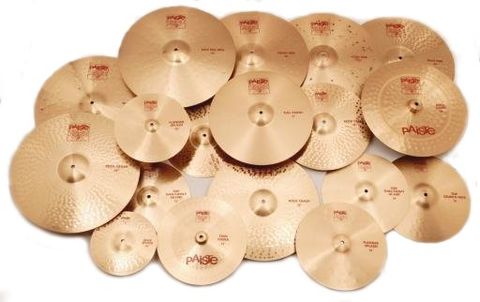As far as classic cymbals go, Paiste's 2002 line is up there with the best of them. First introduced in 1971, the typically powerful, ballsy 2002 tone has been much admired by rock players in particular ever since.
Today the series is an extensive one; alongside the 'standard' options are some interesting instruments, particularly in the ride and crash departments. For this review, we are focusing on a selection of highlights from the current crop to give you a flavour of the many and various strengths of the 2002 style.
Decisions, decisions
Rather than choosing a handful of metals at random, we ended up picking out a good cross-section of 2002 rides for comparison, a group of the Rock cymbals and a set made up of some of the more diverse members of the clan. Perhaps the easiest group to get to grips with is to be found on the Rock branch of the 2002 tree - in as much as there are no funny names like Crush ride or Flanger splash to fathom (we'll come to those two later).
Distinctive by virtue of their heavy hand-hammered marks, the Rock range does very much what it hints at in its title. In short, the instruments that fall into this sub-series are clean-toned, big-lunged types that will power most medium-to-heavy bands. But that's not to say these are all muscle and no class.
The 14" Rock hats are full-bodied and loud, but surprisingly flexible thanks to a sensibly-balanced upper mid-range; similarly the benchmark 20" Rock ride washes very nicely if pushed, but remains controllable. The piercing bell tone and near-perfect stick definition place it firmly in the 'dominating' category though.
The 16" version of the Rock crashes is supremely punchy with an attacking front end but it's silvery and quick-decaying, so it retains some real class; its big 19" brother meanwhile boasts massive tone and is lovely and full - riding this cymbal is completely addictive.
Falling between the two crashes mentioned, in terms of size at least, the 18" Rock China hits the target too, being explosive and pleasingly shrill, delivering a wall of marginally useful white noise only when over-provoked.
Crush and crunch
Two of the most intriguing product titles in the current 2002 line-up are the Crunch hats and the Crush ride. So these two, along with a couple of Full crashes (16" and 18") and an 18" Thin China, were next up on the stands. The Crunch hats are available as 14" or 15" types.
The medium thin top and medium heavy bottom of the pair conspire to produce a gorgeous funky, slightly soft and dark response which isn't as voluminous as you might expect when played closed. As soon as you reduce pressure on the hi-hat stand footplate, however, there's a real leap - these babies get loud very suddenly. The cool tonal characteristics remain, however, and the half-open roar of the Crunch hats is very enticing indeed.
The Crush ride makes for a good partner to the Crunch hats. It's a brighter-sounding affair, but still displays no little depth and richness of tone. Paiste describe the Crush as being suited to 'forceful playing' but don't assume it's just for thick-forearmed rockers. The sweet ping tone and balanced wash make it a real consideration for electric jazz and other generally funky stuff.
So far there's not been a bad cymbal in this bunch. And the Full crashes keep things right on track. Softer than the tough-edged Rocks, the 16" and 18" crashes are blessed with a sizzly, crisp top end and a clarity that secures their 'perfect pop' credentials. The 18" is big but not unwieldy and the extra warmth over the Rock line adds sophistication.
Rounding out this particular array, the 18" Thin China is a great choice as an all-rounder - it's stunningly fast to react and decays with haste too, so it's an ideal accenter, if less powerful than the Rock China when ridden.
Riding high
Such is the diversity of the 2002 ride offering we couldn't ignore three more of the 20" cymbals. So the Cool, Deep Full and Wild rides came under scrutiny before packing up shop with the playing part of this review. And what a wide range of characters they prove to be.
The Cool version is dark, soft and woody and while its versatility is limited by its medium thin nature (it's not heavy enough to be used at the louder end of the spectrum), it acquits itself well for jazz-inspired styles.
The medium-weight Deep Full ride is quite different. Each stick impact is very clearly defined and strident, but backed up with an easily excited but warm wash. And it makes a cracking crash if you've got the biceps for it.
Stepping up the weight ladder another rung, the Wild Ride would challenge most biceps in trying to crash it consistently, but it fulfils its primary function - as an up-front, washy and full-figured ride - marvellously.
At completely the opposite end of the 2002 series, the 13" Thin/Heavy hi-hats and 14" Flanger splash were the last two instruments to come under my increasingly weary sticks. The hats deliver a tight, confident 'chick' and would be great in the studio - they don't take up more sonic space than necessary and are totally controllable.
The splash, on the other hand, is gong-ier than your typical splash (and bigger, too) but works well to provide a slightly wobbly, fast decaying crash tone.


